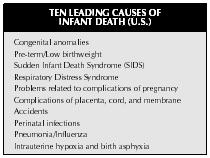Sudden infant death syndrome (SIDS)
Sudden infant death syndrome (SIDS) is the term used to describe the sudden and unexplained death of an apparently healthy infant. This unpredictable and unpreventable phenomenon is the leading cause of death in babies less than one year old and strikes infants of all ethnic or economic backgrounds. Several theories exist but none can fully explain it or stop it from happening.
SIDS in history
The sudden death of a baby while sleeping, although tragic, is nothing new. It has a history of at least 2,000 years and is even mentioned in the Bible. In First Kings, the story is told of how King Solomon judged who was the real mother of a surviving child. The child's dead sibling was thought to have "died in the night because she overlaid it." "Overlaying" or the accidental suffocation of an infant by an adult who rolled on the baby while sleeping was for centuries thought to be the only reasonable explanation for an apparently healthy infant going peacefully to sleep and never waking up. In ancient Egypt, a mother who was judged to be responsible for doing this was sentenced to hold the dead infant for three days and nights. The first known medical textbook written during the second century A.D. by Greek physician Soranus of Ephesus instructs mothers and wet-nurses (female servants who were nursing or breast feeding their own child and who also would nurse the baby of their mistress or employer) never to sleep with infants in case they should accidentally fall asleep on the baby and somehow suffocate it.
References to "overlaying" are known to exist throughout the centuries, and it appears again and again in church records and doctors' records. It is even found in records from the Plymouth colony in New England where it was called "stifling." The question of whether a baby had been killed deliberately by an adult was always in the background, and often authorities would have to judge the fate of parents whose healthy infant died suddenly and therefore suspiciously.
Nineteenth-century doctors naturally tried to explain scientifically these sudden deaths of babies, and one of the first such explanations was that the infant suffered from some sort of respiratory ailment. By the beginning of the twentieth century, sleep apnea (pronounced AP-nee-uh), in which a baby stops breathing for some reason but does not start up again, was considered a cause. By the 1930s, the role of infection was being considered, and by the 1940s, most American mothers were no longer taking their children to bed with them for fear of accidentally smothering them.
Words to Know
Apnea: Cessation of breathing.
Hypoxia: A deficiency of oxygen reaching the tissues of the body.
International attention
The first modern study of any and all of the factors that might be involved in a case of sudden infant death was done in 1956. By the late 1950s, many thought that such death was caused by some sort of abnormal function of the baby's breathing reflex. During the 1960s, many new theories were offered, such as a hypersensitivity to milk, an abnormal heartbeat, or some form of hypoxia (pronounced hi-POCKS-ee-uh), which is a lack of oxygen. In 1963, the first international conference on sudden infant death was held in Seattle, Washington, which produced not only more theories but also increased awareness on the part of the public. It was at the second international conference that a definition was agreed upon and the condition came to be named SIDS. The definition also stressed that all possible known causes must have been ruled out by an autopsy, a death scene investigation, and a careful review

| TEN LEADING CAUSES OF INFANT DEATH (U.S.) |
| Source: Monthly Vital Statistical Report , 46, no. 1 Supplement, 1996. |
| Congenital anomalies |
| Pre-term/Low birthweight |
| Sudden Infant Death Syndrome (SIDS) |
| Respiratory Distress Syndrome |
| Problems related to complications of pregnancy |
| Complications of placenta, cord, and membrane |
| Accidents |
| Perinatal infections |
| Pneumonia/Influenza |
| Intrauterine hypoxia and birth asphyxia |
of the medical history. These guidelines are still followed today. During 1972, the issue of SIDS received even more attention as the United States Congress held hearings on the subject and increased funding for research.
SIDS victims
Despite this history and attention, it is nonetheless still true that in the U.S., more children die of SIDS in one year than die of cancer, leukemia, heart disease, cystic fibrosis, and child abuse combined. SIDS is, therefore, the leading killer of children between one week and one year of age. What physicians know about SIDS is more of a description than a real understanding. They know that it occurs to infants up to one year old, but most often between the ages of two and four months. It occurs during sleep and strikes without warning. It may occur a few minutes after a baby is put down for the night or after sleeping all night. It has even happened to a sleeping baby in a parent's arms. It affects all types of children in all types of families, and has no relation to ethnicity or income level. However, for some reason, African-American infants die of it twice as often as white infants. Males babies are 50 percent more likely to die of SIDS than females, but neither parents nor doctors can tell which babies will die.
Risk factors
Although no specific cause is yet known, researchers have put together a typical case of what does happen when SIDS strikes. They now believe that certain babies are more at risk than others, and that babies born with one or more conditions can make them especially vulnerable to the normal stresses that all babies experience. Some of these risk factors are stress caused by infection, a birth defect, or a failure to develop. Other factors that are believed to increase vulnerability are premature birth, low birth weight, a sibling who died of SIDS, or babies who have a twin. Other external factors that seem to matter include cigarette smoking or drug use by the mother during pregnancy as well as other medical complications she may have experienced while pregnant. Finally, statistics show that babies who are breast-fed are less likely to die suddenly than those who were bottle fed. The very number of these factors points out how little modern science knows about this syndrome.
Search for a cause
As to what causes SIDS, two major theories best exemplify the hundreds of theories already proposed. One of these says that SIDS happens to normal, healthy babies who have something go wrong with them because of the fact that they are developing so rapidly. This notion of SIDS as a developmental phenomenon argues that because a baby's brain is growing so quickly during its first six months, there is the possibility that it may send an abnormal or wrong message to a critical organ system. For example, it might tell the throat to "close off" instead of "open up" after a breath. The other major theory says that babies who die from SIDS were basically not healthy infants, and that some condition predisposed them to it. This idea says that the baby's developmental experience in the womb before it was born may have made it more at risk. Like the other theory, this theory also focuses on the brain, but argues that it is significant that many SIDS victims have subtle or minor brain abnormalities in the part of the brain that affects sleep.
Over a long period of time, the number of SIDS deaths has tended to remain roughly the same (about 4,000 a year), although starting in 1993 the rate of SIDS decreased some 30 percent. This is thought to be the result of a 1992 effort to educate parents to the fact that infants who sleep

on the stomachs are more at risk than those who sleep on their backs. It is now standard practice for doctors to tell new parents that normal babies should sleep face up during the first six months of life.
The death of any child is a terrible thing, but when it occurs with such suddenness and with no forewarning, it can be devastating to the survivors. Often, parents cannot rid themselves of guilt feelings that somehow they were to blame or that they could have done something to prevent it. Fortunately, there are many support groups available for both parents and siblings of a SIDS victim, many of whom feel so bad they become psychological victims themselves. With all the attention and research that SIDS is attracting, the rate of the syndrome may be falling. However, because SIDS is still so unpredictable, researchers must continue their work to seek a cause. Many believe that when SIDS is finally understood, it will have more than one simple explanation.